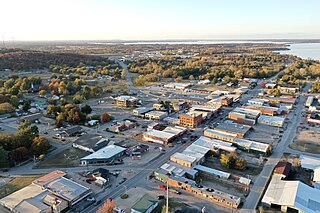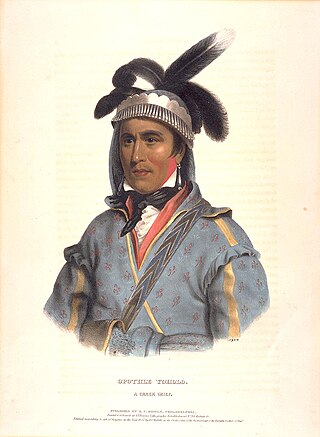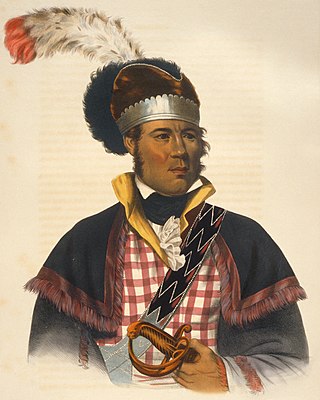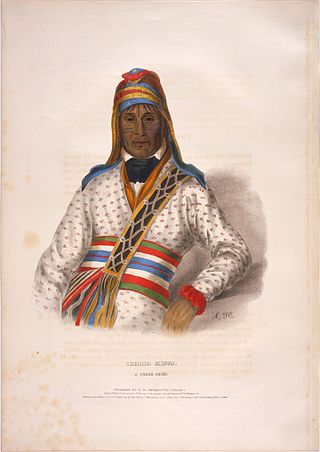
The Muscogee, also known as the Mvskoke, Muscogee Creek, and the Muscogee Creek Confederacy, are a group of related Indigenous peoples of the Southeastern Woodlands in the United States of America. Their historical homelands are in what now comprises southern Tennessee, much of Alabama, western Georgia and parts of northern Florida.
Creek mythology is related to a Muscogee tribe who are originally from the southeastern United States, also known by their original name Mvskoke, the name they use to identify themselves today. Mvskoke is their name in traditional spelling. Modern Muscogees live primarily in Oklahoma, Alabama, Georgia, and Florida. Their language, Mvskoke, is a member of the Eastern branch of the Muskogean language family. The Seminole are close kin to the Mvskoke and speak an Eastern Muskogean language as well. The Muscogee were considered one of the Five Civilized Tribes. After the Creek War many of the Muscogee escaped to Florida to create the Seminole.

Chattahoochee County, also known as Cusseta-Chattahoochee County, is a county located on the western border in central Georgia. As of the 2020 census, the population was 9,565. The county seat is Cusseta, with which the county shares a consolidated city-county government. The city of Cusseta remains a geographically distinct municipality within Chattahoochee County. The county was created on February 13, 1854.

Cusseta is a city in Chattahoochee County, Georgia, United States. It is part of the Columbus, Georgia-Alabama Metropolitan Statistical Area. The population was 11,267 at the 2010 census. The city is the county seat of Chattahoochee County, with which it shares a consolidated city-county government. Despite this, Cusseta is not coterminous with the county; it remains a geographically distinct municipality within the county.

Eufaula is a city and county seat of McIntosh County, Oklahoma, United States. The population was 2,813 at the 2010 census, an increase of 6.6 percent from 2,639 in 2000. Eufaula is in the southern part of the county, 30 miles (48 km) north of McAlester and 32 miles (51 km) south of Muskogee.

The Creek War, was a regional conflict between opposing Native American factions, European powers, and the United States during the early 19th century. The Creek War began as a conflict within the tribes of the Muscogee, but the United States quickly became involved. British traders and Spanish colonial officials in Florida supplied the Red Sticks with weapons and equipment due to their shared interest in preventing the expansion of the United States into regions under their control.

The Ocmulgee River is a western tributary of the Altamaha River, approximately 255 mi (410 km) long, in the U.S. state of Georgia. It is the westernmost major tributary of the Altamaha. It was formerly known by its Hitchiti name of Ocheese Creek, from which the Creek (Muscogee) people derived their name.

Ocmulgee Mounds National Historical Park in Macon, Georgia, United States preserves traces of over ten millennia of culture from the Native Americans in the Southeastern Woodlands. Its chief remains are major earthworks built before 1000 CE by the South Appalachian Mississippian culture These include the Great Temple and other ceremonial mounds, a burial mound, and defensive trenches. They represented highly skilled engineering techniques and soil knowledge, and the organization of many laborers. The site has evidence of "12,000 years of continuous human habitation." The 3,336-acre (13.50 km2) park is located on the east bank of the Ocmulgee River. Macon, Georgia developed around the site after the United States built Fort Benjamin Hawkins nearby in 1806 to support trading with Native Americans.

The Yuchi people, also spelled Euchee and Uchee, are a Native American tribe based in Oklahoma.

Opothleyahola, also spelled Opothle Yohola, Opothleyoholo, Hu-pui-hilth Yahola, Hopoeitheyohola, and Hopere Yahvlv was a Muscogee Creek Indian chief, noted as a brilliant orator. He was a Speaker of the Upper Creek Council and supported traditional culture.

William McIntosh, was also commonly known as Tustunnuggee Hutke, was one of the most prominent chiefs of the Creek Nation between the turn of the nineteenth century and his execution in 1825. He was a chief of Coweta town and commander of a mounted police force. He became a large-scale planter, built and managed a successful inn, and operated a commercial ferry business. Early American historians attributed McIntosh's achievements and influence to his mixed race Scots/European ancestry. Since the late 20th century, historians have argued much of McIntosh's political influence stemmed more from his Creek upbringing and cultural standing, particularly his mother's prominent Wind Clan in the Creek matrilineal system, and to other aspects of Creek culture.

The Treaty of Cusseta was a treaty between the government of the United States and the Creek Nation signed March 24, 1832. The treaty ceded all Creek claims east of the Mississippi River to the United States.
Hitchiti was a tribal town in what is now the Southeast United States. It was first known as part of the Apalachicola Province, an association of tribal towns along the Chattahoochee River. Shortly after 1690, the towns of Apalachicola Province moved to the central part of present-day Georgia, with Hitchiti joining most of those towns along Ochese Creek. In 1715, most of the towns on Ochese Creek, including Hitchiti, moved back to the Chattahoochee River, where the town remained until its people were forced to move to the Indian Territory as part of the Trail of Tears. Hitchiti was one of several towns whose people spoke the Hitchiti language.

The Creek War of 1836, also known as the Second Creek War or Creek Alabama Uprising, was a conflict in Alabama at the time of Indian removal between the Muscogee Creek people and non-native land speculators and squatters.
Apalachicola was the name of a Native American tribal town, and of a group of towns associated with it, which the Spanish called Apalachicola Province, located along the lower part of the Chattahoochee River in present-day Alabama and Georgia. It is believed that before the 17th century, the residents of all the Apalachicola towns spoke the Hitchiti language, although other towns whose people spoke the Muscogee language relocated among the Apalachicolas along the Chattahoochee River in the middle- to later- 17th century. All of the Apalachicola towns moved to central Georgia at the end of the 17th century, where the English called them "Ochese Creek Indians". They moved back to the Chattahoochee River after 1715, with the English then calling them "Lower Creeks", while the Spanish called them "Ochese".

The Eufaula people were a tribe of Native Americans in the United States, located in the Southeast. A Muskogean-speaking people, they possibly broke off from the Kealedji or Hilibi tribe. They were part of the Muscogee Creek Confederacy.

Coweta was a tribal town and one of the four mother towns of the Muscogee Confederacy in what is now the Southeast United States, along with Kasihta (Cusseta), Abihka, and Tuckabutche.
The Treaty of Indian Springs, also known as the Second Treaty of Indian Springs and the Treaty with the Creeks, is a treaty concluded between the Muscogee and the United States on February 12, 1825 at what is now the Indian Springs Hotel Museum.
Apalachicola was a tribal town in the Apalachicola Province in the 17th century, located on the lower part of the Chattahoochee River in what is now Alabama and Georgia. The residents of the town spoke the Hitchiti language. The town of Apalachicola moved to the Savannah River in the early 1690s, when the other towns in Apalachicola Province moved to central Georgia, primarily to sites along the Ocmulgee River. In 1715, Apalachicola moved back to the Chattahoochee River along with the towns that had been on the Ocmulgee River, with the English then calling them "Lower Creeks", while the Spanish called them "Ochese". The town of Apalachicola continued as part of the Lower Towns through the 18th century.
The Apalachicola band consisted of several Native Americans towns, primarily speakers of the Muscogee language, living along the Apalachicola River in northern Florida in the early 19th century. The 1823 Treaty of Moultrie Creek assigned the Apalachicola band several small reservations along the Apalachicola River, separate from the main reservation created in central and southern Florida for the people collectively called Seminole. The Apalachicola band was allowed to stay on their reservations for only a decade, before being moved to the Indian Territory.